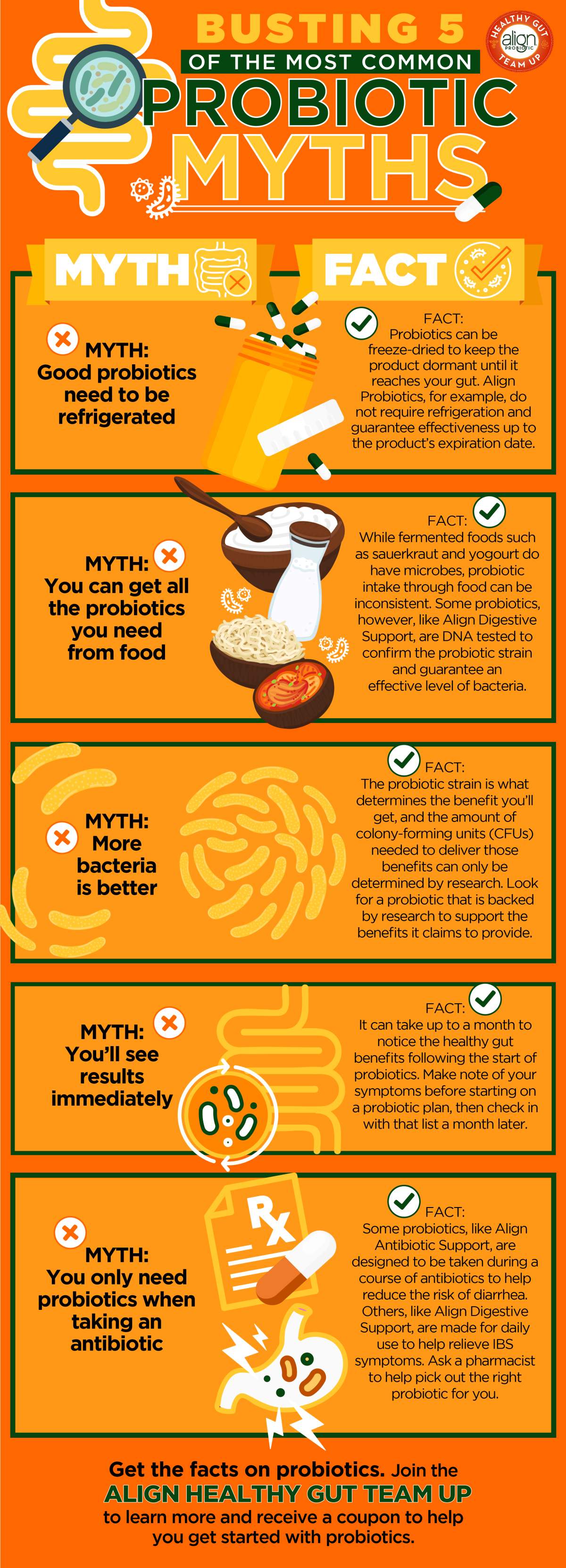You’ve got that gassy, bloated feeling again. You know you could do more to support your gut health — so what can you take to help relieve symptoms like gas, bloating, and abdominal discomfort? Is there something you can do other than avoid certain foods or add healthier ones to your diet?

Probiotics might be the answer. Probiotics are supplements containing living strains of bacteria. When they’re introduced to your system, they proactively support your body’s overall health and wellness. “Probiotics are like tourists. They make their way through the gut, and after they’ve done their job, they leave,” says Andrea Hardy, a registered dietitian with Calgary-based Ignite Nutrition Inc. “Many people think they’re going to take a probiotic and it’s going to set up camp in their gut forever, because we do have microbes in our gut. But this just isn’t the case.”
In partnership with Align Probiotics, here’s how to choose a probiotic.
Read the label
When surveying the probiotic shelf, you’re likely to notice how probiotics are measured: in CFUs, or colony-forming units. “CFUs are a measure of how many microbes are actually in that particular product,” Hardy says.
Those CFU numbers vary widely, but Hardy says they don’t necessarily indicate how effective a probiotic may be. It’s the probiotic strain that determines the benefit of a probiotic, and the amount of CFUs needed to deliver those benefits can only be determined by research.

Get breaking National news
“It’s important to know that not all probiotics are made equally. What really matters is that we match the right strains to the right person for the right reason,” Hardy says. “Specific strains, like the strain in Align Digestive Support, have research to show that they relieve irritable bowel syndrome symptoms such as abdominal discomfort, gas and bloating. Not every probiotic on the shelf is going to do that.”
While it’s tempting to reach for the probiotic with the highest CFUs, Hardy suggests instead taking a closer look at the label to find out if that product contains the right strain that will provide the right benefits (like irritable bowel syndrome, or IBS, symptom relief) that you need.
READ MORE: Suffer from gas or bloating? How to reset your digestive system
Tools to help choose a probiotic
“Choosing a probiotic that is able to say, ‘We have good supporting clinical research’ can be really helpful. To make claims on a probiotic, the evidence has to support it,” Hardy says. “Sometimes there are strains on the shelf that have no research at all. I see a lot of people waste money on probiotics picked randomly off the shelf.” Reading the label will tell you if the product is supported by gastroenterologists, if there’s research backing the claim and more.
Better yet, have the clinical guide to probiotic products in Canada chart handy. “This tool goes through the evidence around any probiotic available in Canada and then grades those products,” Hardy says. The chart outlines bacteria strains in the product, the number of capsules required per day and applications (such as relieving IBS symptoms) for more than 35 products.
Health professionals, such as a pharmacist, physician or registered dietitian, can also help select the right probiotic for you.
READ MORE: Learn how to manage irritable bowel syndrome with proper nutrition
When to take probiotics
“The best time to take it is the time you remember to take it,” Hardy says. She suggests chaining it to another daily habit — think keeping your probiotic right by your toothbrush or next to your coffeemaker so you won’t forget. Be sure to read the label, she adds, to ensure you’re taking the correct dose per day.
Have questions about probiotics? Join the Align Healthy Gut Team Up to learn more and get a coupon to help you get started with probiotics!


